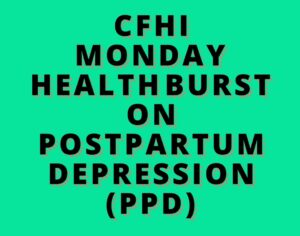POSTPARTUM DEPRESSION (PPD)

Postpartum depression (PPD) or postnatal depression is a complex mix of physical, emotional, and behavioural changes that happen in some women after giving birth. According to the Diagnostic and Statistical Manual of Mental Disorders, Fifth Edition (DSM-5), PPD is a form of major depression that begins within 4 weeks after delivery.
Symptoms of postpartum depression can be hard to detect. However, many women have these symptoms following childbirth: Difficulty sleeping, change in appetite, excessive fatigue, decreased libido, frequent mood changes, depression, low self-esteem, suicidal thoughts, panic, thoughts of hurting someone else, and obsessive-compulsive disorder (OCD). The OCD obsessions are usually related to concerns about the baby’s health, or irrational fears of harming the baby.
There is no one cause of postpartum depression. A number of factors can increase the chances: A history of depression prior to becoming pregnant, or during pregnancy; Age at time of pregnancy; Ambivalence about the pregnancy; Number of children — the more children, the more likely it is for one to be depressed in a subsequent pregnancy; Having a history of depression or premenstrual dysphoric disorder (PMDD); Limited social support; Loneliness during pregnancy; Marital conflict; Sleeplessness; Anxiety; Hormonal imbalance — The dramatic drop in oestrogen and progesterone after giving birth may play a role. Other hormones produced by the thyroid gland may also drop sharply and make one feel tired, sluggish, and depressed.
The diagnosis of postpartum depression is based not only on the length of time between delivery and onset, but also on the severity of the depression. PPD often keeps one from doing their daily activities. Hence, when the ability to function is affected, it is important to consult a health care provider, such as Obstetrician-gynaecologist or primary care doctor, who will screen for depression symptoms and develop a treatment plan. This is because PDD symptoms worsen when left untreated. Though PPD is a serious condition, it can be treated with medication and counselling.
Postpartum depression is treated differently depending on the type and severity of a woman’s symptoms. Treatment options include anti-anxiety or antidepressant medications, psychotherapy, and participation in a support group for emotional support and education. For severe cases, intravenous infusion of a new medication called brexanolone (Zulresso) may be prescribed.
Monday Health Burst is an initiative of CFHI to address basic health issues. Join us every Monday on all our social media platforms for more health-related articles.


